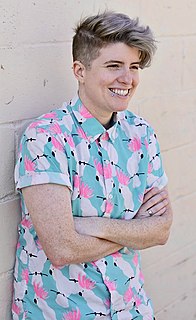A Quote by John Wesley
It cannot be that the people should grow in grace unless they give themselves to reading. A reading people will always be a knowing people.
Related Quotes
Reading the Bible is the fast track to atheism. Reading the Bible means starting at "In the beginning..." and throwing it down with disgust at "...the grace of the lord Jesus be with all. Amen." I'm sure there are lots of religious people who've read the Bible from start to finish and kept their faith, but in my self-selected sample, all the people I know who have done that are atheists.
Certainly with a book, people are going to be able to read it and give themselves permission to have that delicious feeling of being terrified because they're in a safe place while they're reading. That's what you can rely on as a writer, that people can let themselves be really frightened because they're really all right.
While we pay lip service to the virtues of reading, the truth is that there is still in our culture something that suspects those who read too much, whatever reading too much means, of being lazy, aimless dreamers, people who need to grow up and come outside to where real life is, who think themselves superior in their separateness.
People are more likely to search for specific books in which they are actively interested and that justify all of that effort of reading them. Electronic images and sounds, however, thrust themselves into people's environments, and the messages are received with little effort. In a sense, people must go after print messages, but electronic messages reach out and touch people. People will expose themselves to information in electronic media that they would never bother to read about in a book.
My personal view is that reading has to be balanced. Obviously, there's a certain amount of reading that we have to do academically to continue to learn and to grow, but it's got to be balanced with fun and with elective reading. Whether that's comic books or Jane Austen, if it makes you excited about reading, that's what matters.
People cannot stand the saddest truth I know about the very nature of reading and writing imaginative literature, which is that poetry does not teach us how to talk to other people: it teaches us how to talk to ourselves. What I'm desperately trying to do is to get students to talk to themselves as though they are indeed themselves, and not someone else.






































